|
|
 |
|
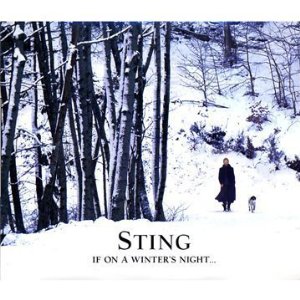
If On A Winter’s Night… by Sting
Music Review
by Andris Silis,
translated
by Zinta Aistars
(Latvian review
below)
ˇ Audio CD (October 26, 2009)
ˇ Price: $16.98
ˇ Number of Discs: 1
ˇ Label: Deutsche Grammophon
ˇ ASIN: B002H3F7F6
Music to recommend,
at least as one way in which to transport oneself to a cooler time of year, especially when outside it is a flaming 90 degrees
Fahrenheit … a cool caress in the heat of summer…
The short-lived
reunion of Police had little effect on Sting’s independent career and path of exploration. Earlier experimentations
with the lute along with a fascination with the work of renown Elizabethan composer John Dowland (1563-1626), culminating
with the recording of Songs From the Labyrinth in 2006 with Bosnian
lutist Edin Karamazov, have now found their way into If On a Winter’s Night …
This time Sting’s
fountainhead of inspiration is winter—this season close to his heart with all its simultaneous harshness and natural
charm. The CD includes songs that encompass several centuries. Here we find the old traditional Christmas songs, as well as
those classics such as Franz Schubert’s The Hurdy-Gurdy Man, with Sting’s anglicized lyrics, and J. S.
Bach’s Sarabandai no. 6 Suite for Cello for which he composed lyrics. There are also two of Sting’s own
songs, The Hounds of Winter and Lullaby for an Anxious Child.
This combination
of several musical eras into one collection does not produce a kaleidoscopic effect, as one might expect, but instead realizes
Sting’s hope of reproducing the effect of winter in all its many facets as a process, as part of a cosmic cycle.
Taking part
in creating this recording is an eclectic grouping of musicians, including producer and arranger Robert Sadin, guitarist Dominic
Miller, and the trio from North London and Scotland, Kathryn Tickell on violin, fiddle and
Northumbrian small pipes, Julian Sutton on melodeon, and Mary MacMaster on metal string Scottish harp. Guest artists include
Vincent Ségal (cello), Daniel Hope (violin), Chris Botti (trumpet), Ibrahim Maalouf (trumpet), Ira Coleman (bass),
Stile Antico (vocal ensemble), Bijan Chemirani (percussion), Cyro Baptista (percussion) and the Webb Sisters (background vocals),
and many, many others.
In spite of
such a large gathering of musicians, Sting has evaded exaggeration, remains forthright if not laconic. The amplitude of his
musical expression is wide—from elements of medieval asceticism to folk, groove and bossa nova, although the asceticism
has taken the upper hand. We hear it most in Sting’s vocals, nowhere near to the Italian bel canto (beautiful
singing).
In spite of
all the criticism aimed at Sting’s singing style, it seems his rough style was an appropriate choice and adds
a fitting ambiance, not without hope. Without any flourishes, Sting sings, straightforward and authentic, about the winter
solstice, when in the darkest hour, hope and light are born again. He does not hide his affection for winter as a season,
at the same time weaving in a philosophical connection to lead one to consider the cosmic and global processes, the rapid
climate changes that have become so evident over the span of one generation.
If On a Winter’s Night… can’t be considered a Christmas album in that
typical sense. This is music that not only moves us to introspection, but also gives cool respite in this blazing summer—a
hope, that winter will come again, after all …

Sting
If On A Winter’s Night…
Recenzejis Andris
Silis
ˇ
Audio CD (October 26, 2009)
ˇ
Price: $16.98
ˇ
Number of Discs: 1
ˇ
Label: Deutsche Grammophon
ˇ
ASIN:
B002H3F7F6
Mūzika, kuru uzdrošinos rekomendēt, kā vienu no iespējām vismaz iztēlē
un noskaņās pārcelties uz vēsāku gadalaiku, it īpaši, ja laukā ir 90+ Deg F...vēss
glāsts vasaras karstumā...
Īslaicīgā Police atkalapvienošanās nav būtiski
ietekmējusi Stinga patstāvīgo solo karjeru un meklējumu ceļu. Jau agrāk iesāktie eksperimenti
ar lautas (lute) spēli un aizraušanās ar izcilā Elizabetes
laiku angļu komponista John Dowland (1563-1626) dziesmām, kas vainagojās
ar albuma ‘’Songs From The Labyrinth’’ izdošanu 2006. gadā kopā ar bosniešu lautistu Edin Karamazov,
nu raduši tālāku izpausmi albumā “If On A Winter’s Night…’’
Šoreiz Stinga iedvesmas avots ir ziema—viņam sirdij tuvs gadalaiks ar visu
tā skarbumu un savdabīgo šarmu vienlaikus. Albumā iekļautas dziesmas, kuras pēc sava rašanās
laika aptver vairākus gadsimtus. Te atrodamas gan senas, tradicionālas Ziemassvētku dziesmas, gan arī
tādi klasiski skaņdarbi, kā Franz Schubert dziesma ‘’Leijerkastnieks’’ (The
Hurdy-Gurdy Man), kurai tekstu Sting ir angliskojis, savukārt J. S. Bach Sarabandai no 6. čello svītas
pats sacerējis arī vārdus. Ir arī divas Stinga paša dziesmas The Hounds of Winter un Lullaby
for an Anxious Child.
Dažādu laikmetu mūzikas apvienojums vienā albumā tomēr nerada
kaleidoskopisku iespaidu, kā to varbūt varētu sagaidīt, bet gan palīdz realizēt Stinga ieceri
atveidot ziemu visā tās daudzšķautnībā kā procesa, kosmiska cikla sastāvdaļu.
Albuma veidošanā dalību ņēmusi
arī interesanta mūziķu sabiedrība, piemēram, producents un aranžētājs Robert Sadin, ģitārists
Dominic Miller, kā arī trīs ievērojamu mūziķu ansamblis
no Ziemeļanglijas un Skotijas: Kathryn Tickell, vijole un Nortumberlendas
mazās dūdas (fiddle and Northumbrian Smallpipes), Julian Sutton, melodeons (melodeon) and Mary MacMaster, metāla stīgu skotu arfa (metal string Scottish
harp). Kā viesmākslinieki darbojušies Vincent Ségal, čello (cello), Daniel Hope, vijole (violin), Chris Botti, trompete
(trumpet), Ibrahim Maalouf, trompete
(trumpet), Ira Coleman, bass (bass),
Stile Antico, vokālais ansamblis (vocal ensemble), Bijan Chemirani, sitamie (percussion), Cyro Baptista, sitamie (percussion) un Webb Sisters, pavadošās balsis (background vocals) un daudzi daudzi citi.
Neraugoties uz kuplo mūziķu pulku, kurš ņēmis dalību albuma tapšanā, Sting
ir izvairījies no pārspīlējumiem, bijis diezgan lakonisks un tiešs. Muzikālās izteiksmes
ziņā amplitūda diezgan plaša—no viduslaiku askētisma līdz pat folk, groove un bossa nova
elementiem, kaut tieši askētisms tomēr šķiet ir ņēmis virsroku. Tas visvairāk izpaužas
Sting dziedāšanas manierē, kas ne tuvu nav itāļu belcanto
(beautiful singing).
Neskatoties uz dažviet izskanējušo kritiku, kas adresēta Sting dziedāšanas manierei,
liekas, ka tā tomēr ir bijusi laba izvēle un ar savu raupjumu rada attiecīgo kolorītu un noskaņu
visam albumam un šī noskaņa nav bezcerīga. Sting bez izskaistinājuma tieši un autentiski dzied
par ziemas saulgriežiem, kad vistumšākajā laikā dzimst cerība, gaisma. Viņš neslēpj savas simpātijas pret ziemu kā gadalaiku, tajā pašā
laikā arī pauž filozofisku attieksmi, liekot aizdomāties par globāliem un kosmiskiem procesiem, par
straujajām klimata izmaiņām, kas tagad jau vienas paaudzes laikā nu kļuvušas skaidri pamanāmas.
If On A Winter’s Night… droši vien nebūtu uzskatāms
par tipisku Ziemassvētku albumu visplašāk pieņemtā izpratnē. Tā ir mūzika, kas ne
tikai var rosināt uz pārdomām, bet arī dot veldzi šajā karstajā vasarā – cerību,
ka kaut kad tomēr pienāks arī ziema…
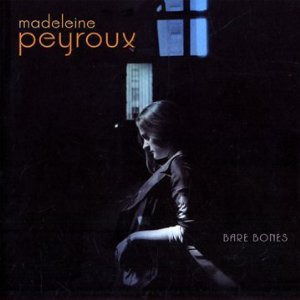
Madeleine Peyroux
Bare Bones
Music Review by Andris Silis
(English translation below)
Audio
CD (March 10, 2009)
Original
Release Date: 2009
Number
of Discs: 1
Label:
Rounder / Umgd
ASIN:
B001KP2Y3K
Price:
$13.98
Mūzika, kura klausāma brīžos, kad ir vēlēšanās
un ir iespēja palikt vienatnē ar sevi...
Madeleine Peyroux:...stop all this talk, turn
off the telephones... (River of Tears)
Līdz
savam ceturtajam albumam Bare Bones Madeleine Peyroux ir nogājusi
tālu ceļu. Tas aizsākās Parīzē, uz kurieni viņa pārcēlās no Ņujorkas
kopā ar māti vēl būdama pusaudze. Tur uzstājusies kopā
ar ielu muzikantiem, dziedājusi bāros un kafejnīcās līdz saviem pirmajiem nopietnajiem panākumiem
22 gadu vecumā – albumam Dreamland (1996). Par laimi tie nesagrozīja viņai galvu un viņa nekļuva
tikai par debitanti – viendienīti, kas spoži uzmirdz un nozūd. MP nemaina savu dzīves stilu, turpina pilnveidoties mūzikā, gūst publikas un kritiķu ievērību
kā arī komerciālus panākumus ar saviem nākošajiem albumiem Careless Love (2004) un Half the
Perfect World (2006). Ja līdz šim Madeleine Peyroux bija vairāk
pazīstama kā dziesmu interpretētāja ar savu (smoky) balsi,
kura klausītājos bieži asociējas ar Billie Holiday vai Edith Piaf, tad albumā Bare Bones viņa
parādās jaunā kvalitātē arī kā dziesmu autore (songwriter). I Must Be Saved pilnībā
sacerējusi Madeleine Peyroux, bet pārējās radītas
ciešā sadarbībā ar albuma producentu Larry Klein, Julian Coryell, Walter Becker, Joe Henry, Sean Wayland
un David Batteau.
Ir
vairāki momenti, kurus gribētos atzīmēt, klausoties šo albumu. Pirmkārt balss – filigrāns,
ļoti smalki niansēts dziedājums, bez liekas ārišķības un uzspēles, tajā pašā
laikā brīvs savā lidojumā un netverams. Izcila meistarība, kas vēl jo vairāk palīdz
izcelt citu albuma kvalitāti – tekstus. Dziesmās atspoguļoti dziļi iekšējie pārdzīvojumi.
Tur ir gan zaudējuma sāpes gan neveiksmīga mīlestība – it kā mūžsenas tēmas,
taču MP to nepasniedz tā, lai viņu žēlotu, taisni otrādi – šīs ciešanas
viņa parāda kā dabīgu procesu, pašattīrīšanos no sārņiem un kopējā
albuma noskaņa ir optimistiska. Viņas varonis iet cauri kritumiem un kāpumiem, trausls savā dvēselē,
bet ļoti stiprs, spēcīgs savā garā un tas viss galu galā dod dziedinošu rezultātu.
I
put on my gloves tonight, pull onto the road to San Berdu
They remind me of hustlers, confidence men, and you
My hands
are warm beneath them, and easy on the wheel
Without your love and treachery the calm is all I feel
(Love
And Treachery)
Ievērības
cienīgs albumā ir pavadošo mūziķu veikums. Ja Madeleine
Peyroux ir tikusi dota pilnīga brīvība izpausties vissmalkākajās niansēs kā īstenai
džeza dziedātājai, tad instrumentācija un pavadījumi ir veidoti ar dziļu pietāti pret dziedājumu.
Šis nav tas gadījums, kad mūziķi savu profesionālo varēšanu cenšas parādīt ar žilbinošām improvizācijām un solo. Te nav nevienas liekas
nots, kas arī parāda mūziķu izcilo veikumu – ar it
kā minimāliem līdzekļiem panākt maksimālo efektu.
Ļoti
gribas domāt, ka māsliniece saviem klausītājiem un cienītājiem sagādās vēl ne
vienu vien patīkamu pārsteigumu savās turpmākajās gaitās. Nav viņai raksturīgi ilgi
gozēties slavas saulē. Ir zināms, ka savā laikā jau pēc pirmajiem panākumiem ierakstu kompānijai
pat nācās nolīgt privātdetektīvus, lai atrastu dziedātāju, kura it kā bija devusies
nezināmā virzienā. Madeleine Peyroux vienkārši
turpināja tālāk savu ceļu sev ierastā veidā – uzstājoties kafejnīcās, bāros
un kaldinot jaunas idejas.
Instead of feeling bad, be glad you got somewhere to go
Instead of feeling sad, be happy
you're not all alone
Instead of feeling low, get high on everything you love
Instead of wastin' time, feel good 'bout
what you are dreaming of
(Instead)
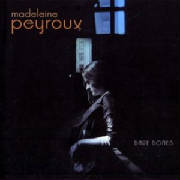
Madeleine Peyroux
Bare Bones
Music Review by Andris Silis
(Latvian translation above)
Audio CD (March 10, 2009)
Original Release Date: 2009
Number of Discs: 1
Label: Rounder / Umgd
ASIN: B001KP2Y3K
Price: $13.98
This is music to be played
in those moments when one wishes for solitude … Madeline Peyroux: … stop all this talk,
turn off the telephones … (River of Tears)
Madeline Peyroux has traversed
a long journey to her fourth recording. That journey began in Paris, where she moved from New York together with
her mother when still a teen. In Paris, she sang with street performers, in bars and cafes, until her first notable
achievement at age 22—Dreamland (1996). Fortunately, this early achievement didn’t turn her head; she is
no passing fad, soon thereafter only to fade away. Peyroux has not changed her lifestyle, continues to evolve in her music,
and she has earned critical as well as popular acclaim with Careless Love (2004) and Half the Perfect World
(2006).
If Peyroux has been known
for her musical interpretations and her smoky voice, evoking Billie Holiday and Edith Piaf, then with Bare Bones
she also shows off her songwriting ability. “I Must be Saved” is entirely hers, music and lyrics, but the remainder
of the tracks are in close collaboration with producer Larry Klein, Julian Coryell, Walter Becker, Joe Henry, Sean Wayland
and David Batteau.
Quite a few moments in this
album are worthy of note. Her voice is one—filigreed, subtly nuanced, without extraneous flash or flair, but
free flowing and easy. Her lyrics are equally masterful. The songs reflect deep emotional experience. We hear the
pain of loss, the heartbreak of love gone wrong—as if eternal themes, yet Peyroux presents them without asking for pity.
Quite the opposite—she expresses these emotions as a natural human process, a self cleansing, and the general tone of
the album is one of optimism. Her hero falls and rises again, has a sensitive soul, yet is powerful in spirit,
and so the result is healing.
I put on my gloves tonight, pull onto the road to
San Berdu
They remind me of hustlers, confidence men, and you
My hands are warm beneath them, and easy on the wheel
Without your love and treachery the calm is all I feel
(Love And Treachery)
Also worth noting are those
who accompany Peyroux on this album. If Madeline Peyroux has freely expressed herself with subtle nuances as a jazz singer,
then the instrumentation and musical accompaniment to her voice is performed with utmost respect for the singer. This is not
the place where a band indulges in brilliant solos and improvisations. Without a single spare note, this
is a musical achievement in its restraint—as if with minimal effort achieving maximum effect.
One hopes Peyroux will continue
to provide such pleasing musical experiences to her listeners. It’s not characteristic of her to sit on her laurels.
It is said that her production company had to once pursue her with the help of private detectives when she lapsed into silence.
She was found in her usual venues—performing in lounges and bars, pursuing her next venture.
Instead of
feeling bad, be glad you got somewhere to go
Instead of feeling sad, be happy you're not all alone
Instead of feeling
low, get high on everything you love
Instead of wastin' time, feel good 'bout what you are dreaming of
(Instead)
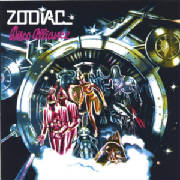
Andris Silis, music editor, is
a graduate of the Jazeps Vitols Latvia Academy of Music in Riga, Latvia with degrees in double bass and music composition. He has played the double bass in the orchestra, “Riga,”
in Latvia, and was principle double bassist in the Keweenaw Symphony Orchestra in Houghton, Michigan (Keweenaw Peninsula). He has played in countless jazz ensembles in Latvia and the United
States. In 1980, he was the guitarist in the Latvian rock group, Zodiak, whose recording, Disco Alliance, sold more than 20,000,000
copies in the Soviet Union, and is still being sold today. Among Andris’ many compositions are “Symphony for Orchestra,”
“Variations and Sonata for Piano,” “Duet for Double Bass and Cello,” “Miniatures for Piano,”
and many others. Andris lives in Ventspils, Latvia.
Andris' essays on music and music reviews will be appearing
on this page throughout the run of this and future issues--check back often for additional reviews. Here, we have asked our
new music editor to tell us a little about his background, growing up in then Soviet-occupied Latvia, learning about music
in his own culture and beyond the Iron Curtain. His essays and reviews will appear in his native Latvian language; see below
for translations into English by editor-in-chief, Zinta Aistars.
|
 |
|
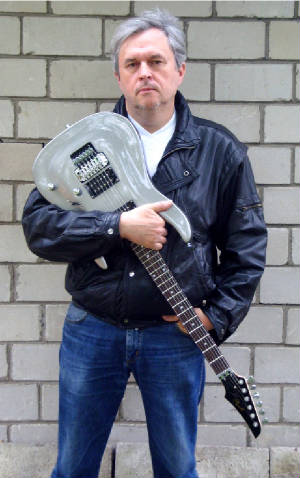
|
| Andris Silis |
Tāla
balss man virtuāli taujā:
-
Pastāsti par to laiku, nu par to, kad bijāt aiz dzelzs priekškara, kā tas bija dzīvot un spēlēt
džezu toreiz, tajos apstākļos?
Dzīvot
un spēlēt, spēlēt un dzīvot, dzīvot un spēlēt, spēlēt un dzīvot...vārdi
sāk it kā savu patstāvīgu dzīvi, griežas trakā dejā arvien straujāk un straujāk
un es nevaru tos satvert, tie izslīd un uzvirmo, uzlido gaisā atkal
un atkal līdz man noreibst galva un es pieceļos un izeju laukā. Vien aizejot sajūtu monitora jautājošo
skatienu, jo neesmu atbildējis uz jautājumu. Laukā mani sagaida gaiša maija diena un zilas, priecīgas
debesis. Atmiņā uzpeld sen klausīta Thomas Morley dziesma no tālā 16. gadsimta:
Now is the month of maying,
When merry lads are playing,
Fa la la la la...
Ir maijs. 2010. gada maijs. Ventspils, Latvija, Eiropas Savienība.
Nu ko, ja jau jautā, tad jāatbild. Vēl tikai jāpaņem pasts un uz priekšu! ...Rēķini,
kaut kādas reklāmas (junk mail) - civilizācijas uzmācīgie pavadoņi, vietējā avīze
ar vietējām ziņām un tirgus cenām. Kāds ar kādu sakāvies, laika apstākļi,
gaida tūristus...Kāpa betonā. Stop! Kaut kur redzēts attēls, zem kura rakstīts īsi un nepārprotami:
ASV armija sagatavojusi sev desantēšanās ceļu! Tas ir tepat, tas ir pavisam netālu no pilsētas.
Attēls, jā, nojaušu no kurienes asociācijas. Sameklēju plauktā US Postage Stamp Catalog, 1945
Commemoratives, prozaisks Scott #929, face value 3c – Iwo Jima...Nē,
tas nav tas pats attēls, bet varēja būt...Kādreiz...Vēl pirms manas dzimšanas.
1963. gada maijs, netālu no Ventspils, Latvijas Padomju Sociālistiskā
Republika, PSRS. Toreiz tur bija pierobežas zona, tādā
vietā uzturēties varēja vai nu tikai tieši tās personas, kas tur dzīvoja, vai arī ar kādām
speciālām atļaujām. Es biju mazs, man bija 5 gadi un man tur dzīvoja vecmāmiņa. Toreiz,
tajā maija dienā viņa aizveda mani pie jūras. Tas ir, ne
jau līdz pašai jūrai. Priekšā bija dzeloņdrāšu žogs, un pie jūras nemaz
tā nevarēja piekļūt. Mēs ar vecomāti stāvējām
un noraudzījāmies no attāluma uz gandrīz neskarto balto smilšu pludmali, kuru vietām bija izdangājusi
padomju robežsargu kara tehnika un varenajiem viļņiem, kas ritmiski triecās pret krastu. Pirmo reizi ieraugot
jūru, skats tiešām bija iespaidīgs! Es mēmā sajūsmā raudzījos varenajos viļņos
un tikai drusku vēlāk ievēroju kaijas. Tās uzvedās tik
brīvi un līksmi, bezbailīgi draiskodamās virs viļņu putainajām galvām, kā atlidojušas
no citas pasaules, kur nav ne dzeloņdrāšu, ne aizliegto zonu, ne pierobežas joslu... – Vecomamm
- bikli jautāju. – Kas ir tur tālāk? – Kur? – Nu, vecomamm, nu tur...tur, kur tā jūra
beidzas. – Zviedrija. – Kas ir Ziedija? – Valsts. Hm, man tas viss likās diezgan nesaprotami, tādēļ ierosināju tūdaļ doties
uz to Ziediju un visu uz vietas noskaidrot. –
Nedrīkst, - vecāmāte sausi un skarbi noteica. Šī intonācija un sakniebtās lūpas mani
atturēja no tālākas taujāšanas, kā sarunājuši, pagriezāmies un devāmies
mājup vairs nepārmijot ne vārda. Mūs vēl ilgi pavadīja jūras šalkoņa un kaiju
nebēdnīgie ķērcieni, bet sirdī bija iegūlies smagums.
Tajā dienā netālajā poligonā atkal bija šaušanas apmācības. Biju
dzimis 13 gadus pēc kara, bet man iznāca uzaugt kaut kādā tādā
dīvainā kara atmosfērā. Apkārtni bija izrakņājuši vācieši – visādi
ierakumi un bunkuri. Savas bērnības kara spēles varēju spēlēt gandrīz reālā vidē,
padomju armijas mācību šāvienu simfonijas pavadījumā. Tanki. Jā, bija arī tanki. Netālu
no mājām veda ‘’tanku ceļš.’’ To rūkoņa bija īpaša. To varēja
dzirdēt jau pa lielu gabalu, tik lielu, lai vēl paspētu izskriet cauri nelielajam mežiņam un nenokavētu
izrādi. Jā, es biju bērns un to uztvēru kā rotaļu. Ar pieaugušajiem bija savādāk.
Viņi bija nerunīgi un daudz nesmaidīja. Tagad raugoties šajā avīzes rakstā, kas nemaz pat
nav ievietots pirmā lapā, tomēr sāku ticēt, ka doma spēj materializēties.
Toreiz, 1945. gadā daudzi ticēja un cerēja, bija bruņoti vīri, kuri mežos turējās
vēl līdz 50to gadu vidum un tā arī nesagaidīja, jo laikam nebija pienācis laiks. Šo cilvēku
vairs nav, bet viņu domas acīmredzot materializējušās un 2010. gada maijā apmēram 20 ASV
armijas celtnieku mierīgi strādā, būvējot ceļu, pa kuru no amerikāņu karakuģa
visai drīz desantēsies 100 militārā transporta vienības.
Vai tam ir kāds sakars ar džezu? Liekas, ka ir. 1945 gadā
Charlie Parker ierakstīja savu slaveno Now Is The Time un tas uz šejieni nonāca daudz ātrāk un to
nespēja aizkavēt ne tanki ne dzeloņdrātis. O.K. Let’s go! One, two, one, two, three, four...NOW IS THE TIME!
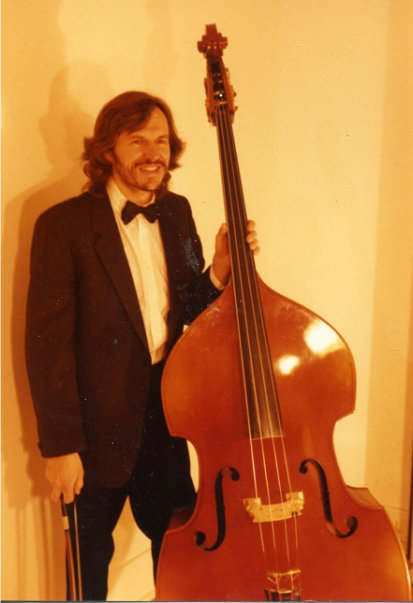
|
| Andris as principal double bassist in the Keweenaw Symphony Orchestra, 1992 |
š
A distant voice,
out of the virtual world, asks:
“Tell
about that time, you know, when you were behind the Iron Curtain, how it was to live then and play jazz then, in such circumstances?”
To live and
to play, to play and to live, to live and to play, to play and to live … the words seem to take on a life of their own,
swirl in a mad dance, faster and ever faster, and I can’t capture them, they slip away and glimmer, swoop up into the
air again and again until my head grows dizzy and I get up and go outside. Just stepping away, I can still feel the computer
monitor’s questioning gaze, because I have not yet replied. Outside a bright May day awaits me, and a blue, bright sky.
An ancient Thomas Morley song from the 16th century floats up into my memory:
Now is the month of maying,
When merry lads are playing,
Fa la la la la...
It is May.
It is May 2010. Ventspils, Latvia, European Union.
Well then,
if I am asked, then I should respond. Now only to gather up the day’s mail and move forward. Bills, some sort of junk
mail—the obnoxious detritus of civilization, the local paper with the local news and market prices. Someone had a fight
with someone, weather forecast, invitations to tourism … a concrete breaker. Stop! That’s a familiar
image, under which clearly reads: the United States Army is clearing a path for troop deployment. This is happening
here, close to town. The image, yes, it resonates. I search my shelves for the US Postage Stamp Catalog, 1945 Commemoratives,
prosaic Scott #929, face value 3 cents—Iwo Jima … No, it is not the same image, but it might have been …
once upon a time… before my birth.
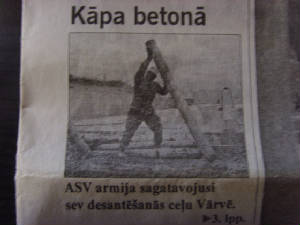

May 1963, not
far from Ventspils, Soviet Latvia, USSR. Back then, that was a border zone, an area where only those with special permission
or those living there could go. I was little, I was 5 years old and my grandmother lived there.
At that time,
on just such a May day, she took me out to the sea. That is, not quite out to the sea. In front of us was a barbed wire fence,
and we could not reach the sea. My grandmother and I stood staring out at areas of nearly untouched white sands
of the coast, in other places crisscrossed by the tire trenches of passing Russian war machinery, and
by the great waves, rhythmically beating against the shore.
Seeing the
sea for the first time, the sight truly was awe-inspiring. In mute amazement, I stared at the great waves and only after some
time noticed the sea gulls. They flew with such abandon and with such joy, playing fearlessly above the foaming water, as
if arrived from another world, a world without barbed wire fences, without forbidden zones, without barriers and boundaries.
—Grandmother, I asked quietly. What’s beyond the water? What’s out there?
—Where?
—Out
there, grandmother, there, where the sea ends.
—Sweden.
—What is Sweeden?
—A country.
Hm, that was
all quite indecipherable to me, so I declared that we must go to this Sweeden and explore this right away.
—It’s forbidden, my grandmother said in a dry and harsh tone.
Her intonation
and pinched lips kept me from asking any more questions. In unison, we turned and headed back toward home, not speaking another
word. The shushing of the sea and the cries of the gulls followed us for a long while, but an inexplicable heaviness had settled
into my heart.
That day, there were
more war exercises in the forbidden zone. I was born 13 years after the war, but I had to grow up in a continual atmosphere
of war. Everywhere the ground was riddled with bunkers and fox holes, dug up by the Germans. My childhood war games could
be played with an uncanny realism, accompanied by the ever present symphony of Russian artillery.
Tanks. Yes,
there were also tanks. Not far from my home was the tank road. Their rumbling was indescribable. It could be heard from a
great distance, so far, that I could still have time to run out to the edge of the woods and watch their games.
Yes, I was
a child, and I thought it was all a game. Not so the adults. They were silent and their smiles were few. Now, looking at today’s
paper, this image that didn’t even warrant the front page, I began to believe that a thought can materialize into something
real.
Back then,
in 1945, many believed and hoped, there were armed men, who lived in the forest well into the 1950s, but their waiting was
in vain, because the time was not yet right. These people are no more, but their hopes, it appears, have materialized, and
in May 2010, some 20 United States troops are peacefully building a road, over which American warships will soon transport
100 military troops.
Does any of
that have anything to do with jazz? It seems so. In 1945, Charlie Parker recorded his famous “Now is the Time,”
and that music traveled here at great speed, and no tanks nor barbed wire could keep it out. Okay, let’s go! One, two,
one, two, three, four … NOW IS THE TIME!
Andris’
music reviews coming soon …
If On a
Winter’s Night … by Sting
Mary Anne
Hobbs Presents Wild Angels by various artists
Namaste
by various artists
|
 |
|
|
 |
|
|
 |
|
|
|
|
|
|
 |

